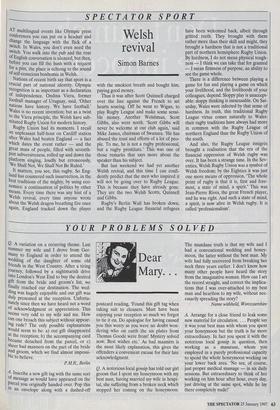SPECTATOR SPORT
Welsh revival
Simon Barnes
AT multilingual events like Olympic press conferences you can put on a headset and change the language with the flick of a switch. In Wales, you don't even need the switch. You walk into the pub and the roar of English conversation is silenced, but then, before you can fill the hush with a request for a pint, the place is echoing to the sound of self-conscious bonhomie in Welsh.
Nations of recent birth say that sport is a crucial part of national identity. Olympic recognition is as important as a declaration of independence. Ondina Viera, former football manager of Uruguay, said, 'Other nations have history. We have football.' Wales is no recent invention; but as a twist to the Viera principle, the Welsh have sub- stituted Rugby Union for modern history. Rugby Union had its moments. I recall an unpleasant half-hour on Cardiff station after Wales had beaten England — a fact which dates the event rather — and the great mass of people, filled with seventh- pint subversiveness, rolled up and down the platform singing, loudly but erroneously, We Shall Not, We Shall Not Be Ruled.' It matters, you see, this rugby. So Eng- land has countered such insurrection, in the best traditions of the mighty, by using eco- nomics: a continuation of politics by other means. Every time there was any hint of a Welsh revival, every time anyone wrote about the Welsh dragon breathing fire once again, England tracked down the player with the smokiest breath and bought him, paying good money.
Thus it was after Scott Quinnell charged over the line against the French to set hearts soaring. Off he went to Wigan, to play Rugby League and make some sensi- ble money. Another Welshman, Scott Gibbs, also went north. 'Scott Gibbs will never be welcome at our club again,' said Mike James, chairman of Swansea. 'He has abused the trust and efforts of a lot of peo- ple. To me, he is not a rugby professional, but a rugby prostitute.' This was one of those remarks that says more about the speaker than his subject.
But last weekend we had yet another Welsh revival, and this time I can confi- dently predict that the men who inspired it will not be going over to Rugby League. This is because they have already gone. They are the two Welsh Scotts, Quinnell and Gibbs.
Rugby's Berlin Wall has broken down, and the Rugby League financial refugees have been welcomed back, albeit through gritted teeth. They brought with them rather more than their skill and might, they brought a hardness that is not a traditional part of northern hemisphere Rugby Union. By hardness, I do not mean physical tough- ness — I think we can take that for granted — I mean firmness of purpose, an ability to see the game whole.
There is a difference between playing a game for fun and playing a game on which your livelihood, and the livelihoods of your colleagues, depend. Sloppy play is unaccept- able: sloppy thinking is inexcusable. On Sat- urday, Wales were infected by that sense of hardness. In truth, this traditional Rugby League virtue comes naturally to Wales: their rugby traditions have always had more in common with the Rugby League of northern England than the Rugby Union of the south.
And also, the Rugby League émigrés brought a realisation that the era of the financial oppression of Welsh rugby was over. It has been a strange time. In the Sev- enties, Welsh Rugby Union was a symbol of Welsh freedom; by the Eighties it was just one more means of oppression. 'The whole point of rugby is that it is, first and fore- most, a state of mind, a spirit.' This was Jean-Pierre Rives, the great French player, and he was right. And such a state of mind, a spirit, is now alive in Welsh rugby. It is called 'professionalism'.


































































 Previous page
Previous page